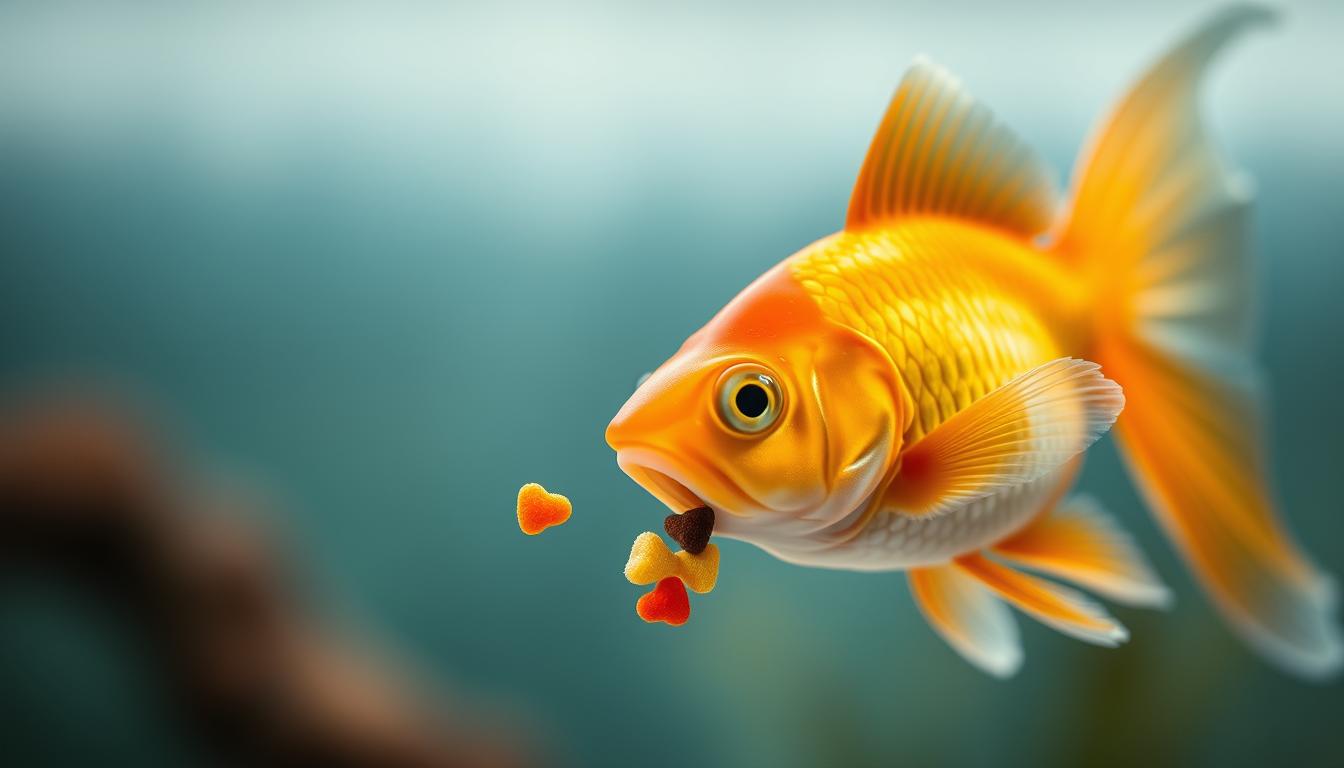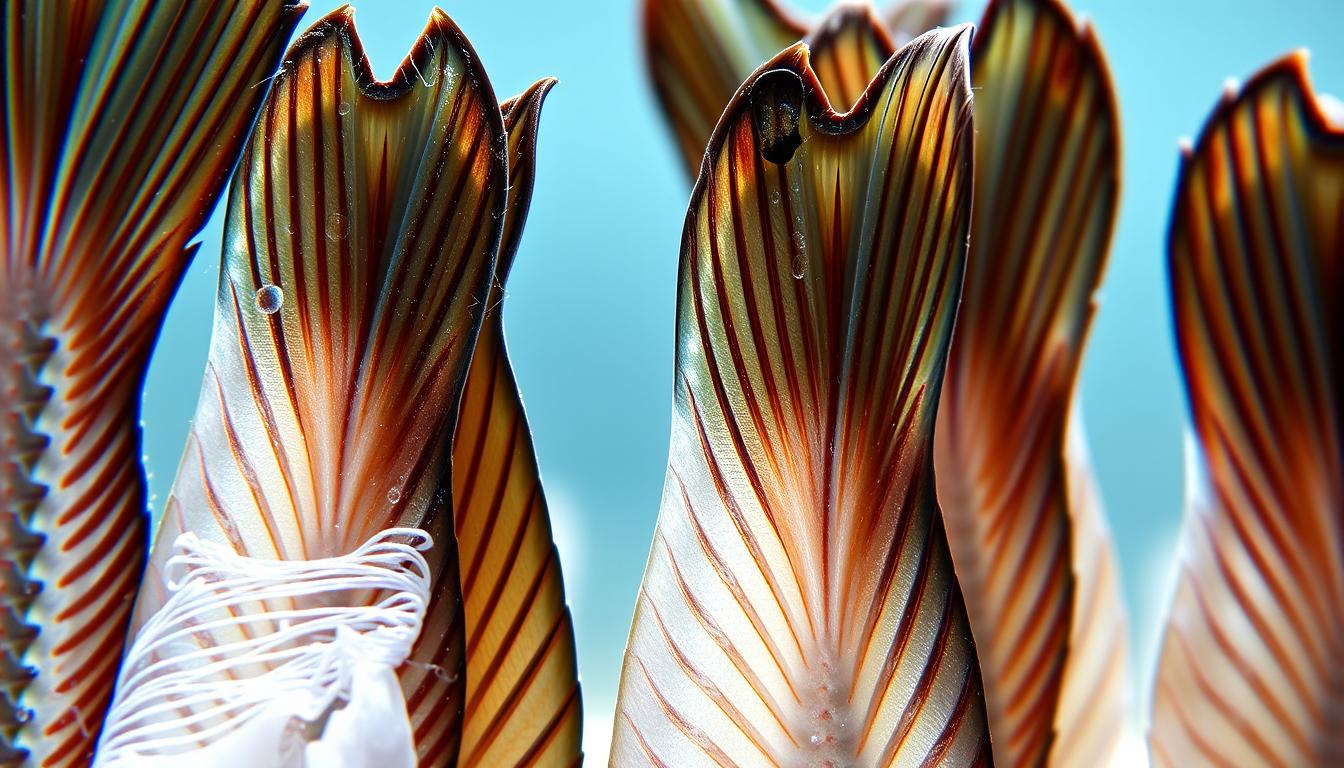can goldfish eat betta fish food
This post may contain affiliate links.
As aquarium enthusiasts, we’ve all been there – you’re about to feed your goldfish, but you realize you’re out of their food. Can you temporarily feed them betta fish food instead?
This question raises a crucial concern for those who keep both species in their tanks. While it might seem like a harmless solution, feeding goldfish betta fish food regularly can have unintended consequences.
Understanding the dietary needs of both betta and goldfish is essential to maintaining their health. In this article, we’ll explore whether it’s safe to feed goldfish betta food and what you can do to keep your aquatic friends thriving.
Key Takeaways
- Understand the fundamental differences between goldfish and betta dietary requirements.
- Learn the potential consequences of cross-feeding between these popular aquarium species.
- Discover practical advice for fish keepers who own both species.
- Find out how to maintain optimal health for your fish through proper feeding practices.
- Get guidance on emergency situations where you might need to feed goldfish betta food temporarily.
Understanding the Dietary Needs of Goldfish and Betta Fish
The nutritional requirements of goldfish and betta fish differ significantly due to their distinct natural feeding habits. Both are popular aquarium fish, but their dietary needs are shaped by their evolutionary adaptations and digestive system structures.
Goldfish Nutritional Requirements
Goldfish are omnivores, consuming a combination of animal and vegetable matter. Their diet includes small plankton like daphnia, freshwater shrimp, algae, and scalded peas. They require a balanced diet of both plant matter and protein sources to thrive.
- Their digestive systems are evolved to process a varied diet efficiently.
- Commercial goldfish foods typically contain lower protein levels (around 30-35%) with higher carbohydrate content.
Betta Fish Nutritional Requirements
Betta fish, on the other hand, are primarily carnivorous. They consume animal matter such as insects, their larvae, and eggs from the water’s surface. Their digestive tracts are designed to process high levels of protein from insect larvae and small crustaceans.
- Betta foods contain significantly higher protein levels (up to 45-50%).
- Their shorter digestive tracts are optimized for protein-rich diets.
Goldfish vs Betta Fish: Key Differences
Differences in origin, temperature preference, and behavior distinguish goldfish from betta fish. These distinctions are crucial for understanding their specific needs and providing appropriate care.
Natural Habitat and Origin
Goldfish and betta fish have different natural habitats and origins. Betta fish originate from the warm, shallow waters of Southeast Asia, specifically the river basins of Chao Phraya and Mekong in Thailand. In contrast, goldfish were first domesticated from wild carp in China and typically inhabit areas of slow-moving water in temperate regions.
Temperature Preferences
The temperature requirements for goldfish and betta fish differ significantly. As tropical fish, betta fish prefer warmer water temperatures between 75° and 80°F. Goldfish, on the other hand, thrive in cooler temperatures, typically between 68° and 74°F. This difference in temperature preference is a key factor in their care.
Behavioral Traits
Behaviorally, betta fish and goldfish exhibit distinct traits. Betta fish, especially males, are often territorial and can be aggressive. In contrast, goldfish are generally social and peaceful, preferring to live in communities. Additionally, goldfish are active swimmers that prefer open water, while betta fish are more sedentary and appreciate dense vegetation and hiding places.
Can Goldfish Eat Betta Fish Food?
While goldfish and betta fish have different dietary needs, there are circumstances where feeding goldfish betta fish food might be considered. Goldfish can technically consume betta fish food, but this should be done with caution.
Short-term vs. Long-term Feeding
In emergency situations, goldfish can eat betta fish food for a short period, typically 1-3 days, without serious harm. However, regular or long-term feeding of betta food to goldfish is not recommended due to differences in their nutritional requirements.
Potential Health Impacts
Feeding betta fish food to goldfish can lead to digestive issues due to the high protein content in betta food. This can cause constipation, swim bladder problems, and potential liver damage in goldfish. Moreover, the excess protein can result in increased waste production, affecting the tank’s water quality and potentially harming the health of the fish.

Why Betta Fish Food Isn’t Ideal for Goldfish
While betta fish food is nutritious, it’s not the ideal diet for goldfish due to several key differences in their nutritional needs. Goldfish and betta fish have distinct dietary requirements that are shaped by their evolutionary history and biology.
Protein Content Concerns
Betta fish food is formulated with high protein levels that are significantly higher than what goldfish require. This can lead to an imbalanced diet that stresses the goldfish‘s digestive system. The concentrated protein in betta food can cause protein overload in goldfish, potentially leading to liver damage and other internal organ issues when fed long-term.

Digestive System Differences
Goldfish are omnivores with digestive systems designed to extract nutrients from both plant and animal matter. In contrast, betta fish are carnivorous with specialized digestive tracts. Feeding goldfish betta fish food can be problematic due to these differences. Goldfish require more complex carbohydrates and plant matter in their diet than what’s typically found in betta-specific foods.
The size and shape of betta food pellets may also be inappropriate for goldfish, potentially causing choking hazards or improper digestion based on the different mouth structures of these fish.
Can Betta Fish Eat Goldfish Food?

While betta fish can technically eat goldfish food, it’s crucial to understand the nutritional implications of this dietary choice. Betta fish are carnivores and require a diet rich in protein.
Nutritional Deficiencies
Feeding betta fish goldfish food can lead to nutritional deficiencies because goldfish food lacks sufficient protein content. Goldfish are omnivores and their food is formulated accordingly, with a mix of protein and carbohydrates.
Potential Health Issues
The primary concern with feeding goldfish food to betta fish is the risk of health issues due to inadequate nutrition. Key concerns include:
- Betta fish can consume goldfish food in emergency situations, but the nutritional profile is inadequate for their long-term health and wellbeing.
- The insufficient protein content can lead to muscle wasting and compromised immune function over time.
- Goldfish foods contain higher levels of plant-based ingredients that bettas cannot properly digest, potentially causing bloating and constipation.
Optimal Diet for Goldfish

A well-rounded diet is essential for goldfish to thrive and maintain their vibrant colors. Goldfish are omnivores, consuming a combination of animals and vegetables.
Commercial Food Options
Commercial goldfish foods should be the base of their diet, containing 30-35% protein. Ingredients like fish meal, shrimp meal, and spirulina provide balanced nutrition.
Supplemental Foods and Treats
Goldfish benefit from regular plant matter, including blanched vegetables like peas and spinach. Live or frozen foods like daphnia and brine shrimp are excellent protein supplements when given in moderation.
Optimal Diet for Betta Fish
Betta fish, being carnivores, have specific dietary requirements that must be met to ensure their health and vitality. Their diet should reflect their natural feeding habits, focusing on high-protein foods.

Commercial Food Options
Quality commercial betta pellets should form the foundation of their nutrition, containing 40-45% protein and minimal fillers. Look for products with whole fish meal, krill, and insect larvae as primary ingredients.
Live and Frozen Food Supplements
Regular supplementation with live or frozen foods like bloodworms, brine shrimp, and mosquito larvae is crucial. These foods mimic their natural diet and provide essential nutrients. Rotating between 2-3 different foods ensures a varied diet and prevents feeding boredom.
Emergency Feeding Situations
Emergency feeding situations can arise for goldfish and betta fish owners due to various unforeseen circumstances. These situations may include unexpected food shortages, delayed shipments, or equipment failures that necessitate temporary tank sharing.
Temporary Food Substitutions
In such emergencies, cross-feeding between goldfish and betta fish might be considered. If betta food is fed to goldfish temporarily, it’s advisable to reduce the feeding amount by approximately 50% to avoid digestive issues. Conversely, when feeding goldfish food to betta fish, supplementing with available protein sources can help mitigate nutritional deficiencies.
How to Minimize Nutritional Impact
To minimize the nutritional impact during emergency cross-feeding, it’s crucial to monitor the fish for signs of distress, such as bloating or unusual swimming patterns. Emergency cross-feeding should be limited to no more than 3-5 days whenever possible.
| Fish Type | Emergency Food | Precautions |
|---|---|---|
| Goldfish | Betta Food | Reduce feeding amount by 50% |
| Betta Fish | Goldfish Food | Supplement with protein sources |

Signs of Improper Nutrition in Fish
Improper nutrition can manifest in various ways in both goldfish and betta fish, making it essential to identify the signs early. Nutritional deficiencies can impact their overall health and resilience to diseases.
Physical Symptoms to Watch For
Physical symptoms of poor diet in goldfish include stunted growth, ragged or deteriorating fins, bloating, and swimming issues. For betta fish, signs include fin clamping, lethargy, and deterioration of their elaborate fins. Both species may exhibit changes in coloration, with dulling or fading of their vibrant hues.

Behavioral Changes
Behavioral changes that suggest nutritional problems include reduced activity, hiding more than usual, loss of appetite, and in some cases, increased aggression due to stress. Both goldfish and betta may show increased susceptibility to common fish diseases when nutritionally compromised.
Maintaining optimal water conditions and monitoring for signs of ammonia spikes due to excessive waste is also crucial for their health.
Conclusion
The happiness and health of goldfish and betta fish depend on understanding their unique needs. Throughout this article, we’ve seen that the key components deciding their happiness, such as temperature, attitude, and environmental needs, differ greatly.
While goldfish can eat betta fish food in emergencies, it’s not a suitable long-term practice due to differences in their digestive systems and nutritional requirements. Similarly, betta fish should not be fed goldfish food regularly as it can lead to nutritional deficiencies.
For optimal health, it’s crucial to respect these differences and maintain species-appropriate foods. In multi-species tanks, purchasing multiple types of fish food is advisable. Understanding the nutritional needs of each species enhances their health, coloration, and overall quality of life in the tank environment.
